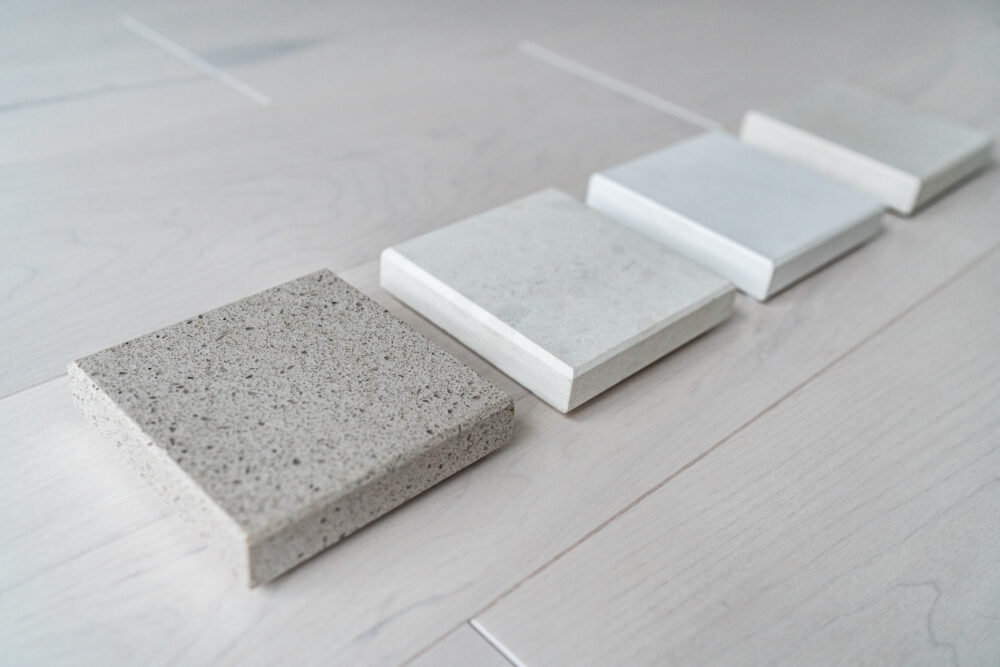Quartz Countertops and Water: Your Complete Spill Guide
You’re hosting a dinner party when someone accidentally knocks over a full glass of red wine onto your beautiful countertop. Your heart skips a beat as you watch the liquid spread across the surface. If you have quartz countertops, you can breathe easy – but understanding exactly how your surfaces react to water and various spills will help you maintain their stunning appearance for years to come.
When homeowners invest in premium countertops, water resistance often tops their list of concerns. After all, kitchens and bathrooms are high-moisture environments where spills happen daily. The good news is that quartz countertops offer exceptional performance when it comes to liquid exposure, but knowing the science behind this durability helps you make informed care decisions.
At Moreno Granite, we’ve installed thousands of quartz surfaces and helped countless families understand how to protect their investment. The key lies in understanding what makes quartz different from natural stone and how this engineered material responds to everything from morning coffee spills to accidental flooding.

How Quartz Countertops Handle Water Exposure
Quartz countertops are engineered stone surfaces composed of approximately 90-95% ground natural quartz crystals bound together with polymer resins and pigments. This manufacturing process creates a non-porous surface that fundamentally changes how the material interacts with liquids compared to natural stones like marble or granite.
When water hits a quartz surface, it simply sits on top rather than penetrating into the material. This non-porous nature means you don’t need to worry about water absorption, which can cause staining, bacterial growth, or structural damage in other materials. The resin binders create a protective barrier that keeps moisture from seeping into the stone particles beneath.
Most quartz manufacturers subject their products to rigorous water absorption tests, typically showing absorption rates of less than 0.5% – significantly lower than natural stones. This impressive performance translates to real-world benefits in your kitchen and bathroom, where humidity and spills are constant challenges.
Beyond Water: How Quartz Responds to Common Household Spills
Coffee, wine, citrus juices, and vinegar-based cleaners represent some of the most common acidic spills in homes. Unlike marble or limestone, quartz surfaces don’t react chemically with acidic substances because the resin binding system protects the quartz crystals from direct contact with these potentially damaging liquids.
However, while quartz won’t etch or develop permanent damage from brief acid exposure, prolonged contact with highly acidic substances can potentially affect the resin binders over time. The practical takeaway is simple: clean spills promptly, but don’t panic if you don’t notice that lemon juice immediately.
Oil-Based Spills and Staining Concerns
Cooking oils, butter, and similar substances behave differently on quartz than water-based liquids. While the non-porous surface prevents absorption, oil-based substances can create temporary surface films that may appear as stains if not cleaned properly.
The engineered nature of quartz means that even stubborn oil-based spills can typically be removed with appropriate cleaning methods. Unlike natural stone, you won’t need specialized poultices or professional restoration services for most spill situations.
Proper Spill Response and Daily Maintenance
When spills occur on your quartz countertops, immediate response isn’t always critical, but prompt attention helps maintain the surface’s pristine appearance. For water-based spills, simply wiping with a clean cloth removes the liquid without leaving residue or causing damage.
More substantial spills benefit from gentle cleaning with warm water and mild dish soap. The non-porous surface means you can clean confidently without worrying about driving contaminants deeper into the material. Avoid abrasive cleaners or scouring pads that might scratch the polished surface, and steer clear of highly alkaline cleaners that could potentially affect the resin components over time.
Regular daily cleaning with appropriate products keeps your quartz looking factory-fresh while protecting your investment. The durability that makes quartz resistant to water damage also makes it remarkably low-maintenance compared to natural stone alternatives.
Long-Term Performance and Peace of Mind
Understanding how your quartz countertops interact with water and spills empowers you to enjoy your surfaces without constant worry. The engineered composition provides consistent performance that won’t change over time like natural stone surfaces that may develop increased porosity or wear patterns.
This reliability means you can focus on enjoying your beautiful kitchen or bathroom rather than constantly monitoring for potential damage. Your quartz countertops will maintain their water resistance and stain resistance for decades with basic care and maintenance.
Moreno Granite’s expert team can help you select the perfect quartz surface for your home and provide detailed care guidance to protect your investment. Contact us today for a free consultation and discover why so many homeowners choose quartz for their most important spaces.
